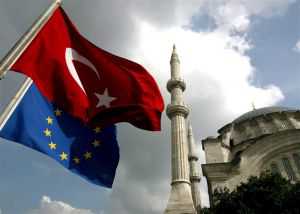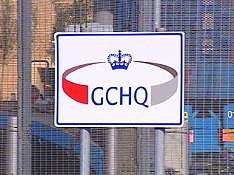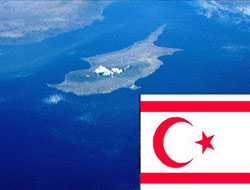 By The Istanbulian — Global Blogger
By The Istanbulian — Global Blogger
The heading is about a possibility. Just a possibility. The EU must work hard to realize it.
What do I mean?
Let’s remember:
In France, the right-wing Sarkozy government can comfortably start a xenophobic debate on national identity, then deport the Roma community by violating the EU acquis communitaire. In the end, the European Commission steps back after initially daring to criticize Sarkozy.
In Germany, even a Social Democrat former minister can voice racist views, stating that the Turkish-Muslim community is lowering the average IQ of the country. And polls reveal that most Germans support these racist views… When the President opposes these views and states that Islam is also a part of Germany now, a right-wing politician, Norbert Geis, can snugly suggest that freedom of religion doesn’t mean the equality of all religions.
Likewise, in the Netherlands, racism in disguise of free speech is now completely tolerated as long as it is anti-Muslim, not anti-Semitic, as can be seen from the ongoing farce to form a coalition government with the help of Islamophobic far-rightists. All these countries with some other ones are about to ban burqa as a stupid, populist action against Islamist extremism.
A similar trend can be observed in several other EU countries, including Italy where the Northern League is a legitimate entity with an openly racist discourse that is adopted by the Berlusconi government and reflected in its asylum/deportation policies.
On the other hand, in Spain, the courts can ban several political parties of an ethnic minority, the Basques, by simply stating that they just don’t condemn separatism. Political demonstrations to protest a court decision can also be banned easily.
In Greece, the government can destroy all of its Islamic heritage dating back to 450-years-long Ottoman rule, making Athens the only European capital without a mosque. It can force its thousands of Muslim citizens and immigrants to pray in a city square on Fridays and in religious holidays.
In Bulgaria and Romania, the government can keep ignoring EU’s economic criteria and take no notice of rampant corruption. Not only they have been accepted as full members of the EU in spite of these violations, but also the EU doesn’t do anything about them even now, although an accession monitoring system is still on as ridiculous first for the Union. “Still failing to meet EU standards” even after accession!
I’m not going list all other EU members that systematically violate different EU rules, like it is with Britain and the rules to protect privacy or Poland and the rules on internal gas market or Hungary and the rules on state aid…
Or almost all member states which don’t apply the decisions of the European Court of Justice that upheld the right of free movement of qualified Turkish citizens in the EU, calling for all EU states to comply with this decision, helplessly.
* * *
Imagine what would happen with the already-stagnated accession process, if Turkey violates one of these EU rules even slightly.
With the French style anti-Roma deportation or the German-Italian-Dutch style normalization of racism, the anti-Turkish front in the EU could immediately stop the accession by naming Turkey as a fascist state… Remember how the EU officials were criticizing the Turkish ban on head scarves in university campuses and how they are silent now for a burqa ban in member states.
The link between PKK, a terrorist organization according to the EU, and its political extensions have been documented clearly in the past (in a more clear way than the Spanish courts did with the links of ETA to Basque parties) and they have been banned in Turkey as such; but the EU had harshly criticized Ankara, while cooperating with Spain.
While Greece was silently destroying almost everything from its Islamic past in spite of the religious needs of its Muslim population, Turkey was protecting most of its Christian and Jewish heritage even though most of the local congregations were too small to keep up these buildings. Then what happened? Turkey is now being criticized for not immediately installing a giant cross on the dome of a renovated Armenian church in a remote island in far east!
And Turkey is still being scolded in EU’s Progress Reports for not fully adopting the economic standards of the Union, even though its economy is much healthier than -not only Bulgaria and Romania, but also- most of the member states now.
* * *
Such double-standards by the EU are not news anymore. However, for the times they are a-changin’, these double-standards are more dangerous now.
The EU, with its right-wing old guard in charge, can still not see that it desperately needs Turkey, much more than Turkey needs it.
If Turkey is alienated by the EU for some more time, the EU will miss the last train of membership, not Turkey.
The rise of Turkey is not the product of the AKP government by the way (AKP still practices the economic strategy which was drawn by Kemal Dervis, a Social Democrat politician, in 2001). By reviewing Turkey’s demographic and economic trends, its prospective rise has been foreseen in early 1980s. In near future, if Turkey adopts a more import-oriented economic strategy, it will be able to support even a more aggressive foreign policy.
By then, the EU may even collapse alongside Euro, while Turkey keeps flourishing by remaining outside the Union. So as I’ve said before, Brussels and the peoples of the EU have only one option as a stimulus now:
Get rid of these racists and enlarge your EU with Turkey, before its too late!
, October 7, 2010
 (Reuters) – Dogan Yayin (DYHOL.IS), Turkey‘s biggest media company, confirmed on Thursday it has received several bids for its units and said an offer from Rupert Murdoch’s News Corp (NWSA.O) was too low.
(Reuters) – Dogan Yayin (DYHOL.IS), Turkey‘s biggest media company, confirmed on Thursday it has received several bids for its units and said an offer from Rupert Murdoch’s News Corp (NWSA.O) was too low.




 Report on Future Strategies for Turkish Republic of Northern Cyprus prepared by Turkish Economy Bank was submitted to TRNC executives on Monday.
Report on Future Strategies for Turkish Republic of Northern Cyprus prepared by Turkish Economy Bank was submitted to TRNC executives on Monday.